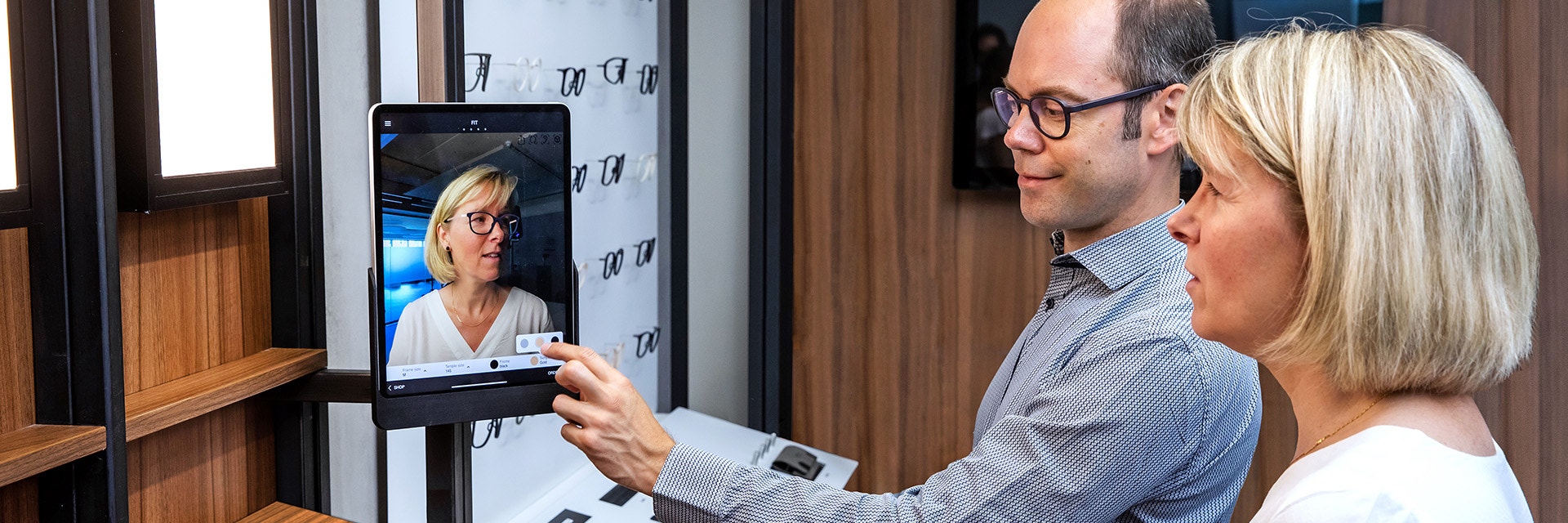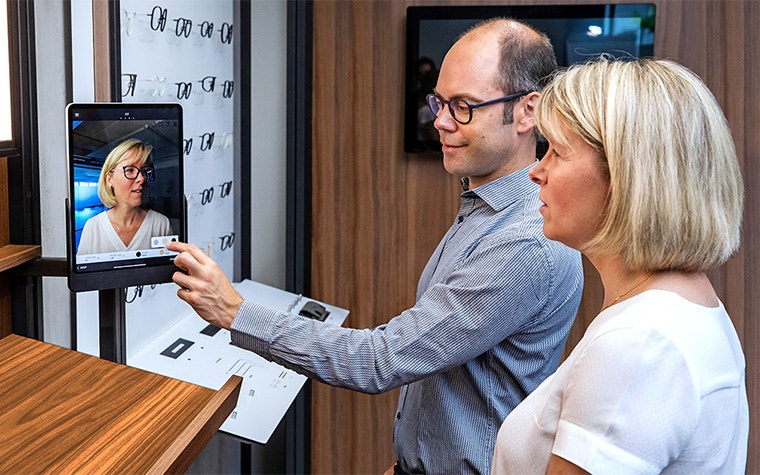PODCAST
3D Printing Eyewear and Digital Transformation
Eyewear retail 2.0 — how digital tools are transforming customer experience
- Subscribe:
- Apple Podcasts
- |
- YouTube
- |
- Spotify


In our 3DP&Me series, we talk to some of the world’s foremost designers to find out and explore the special relationship these individuals have with all things additive.
This episode moves into the world of eyewear retail. Here, we look at how an ecosystem of digital tools can make ‘find, try, fit, and buy’ an engaging multi-channel possibility to deliver a transformative customer experience and distinct business benefits. One which perfectly marries professional knowledge and technology.
Qualified optician, traditionally trained craftsman, and materials evangelist, Frédéric Beausoleil, shares his thoughts on this exciting topic.
- Subscribe:
- Apple Podcasts
- |
- YouTube
- |
- Spotify
Read the full transcript
Alireza: Welcome to this new episode of our 3DP&Me podcast. For those new to the podcast, my name is Alireza Parandian, and I'm Business Development Director for Business Line Eyewear in Materialise. In today's episode, we move into the world of eyewear retail. Here we look at how an ecosystem of digital tools can be leveraged to deliver an elevated customer experience and other distinct business benefits. Helping me to do this today is my friend Frédéric Beausoleil, qualified optician, traditionally trained craftsman, eyewear artist, and material evangelist. With over 30 years of design experience and a passion for putting designers’ glasses within everyone's reach, Frederic has created eyewear concepts and collections for many leading names and is currently the design partner for Maison Acuitis. Welcome, Frédéric. How are you?
Frédéric: Hello Alireza, happy to be with you.
Alireza: Thank you very much, Frédéric. Perhaps a good place to start is for you to tell a little bit to us about how digital solutions have become a part of your life as an artisan.
Frédéric: Yes, I graduated as an artisan. I was trained by a craftsman manufacturer. I have no education in digital things. I was always being interested by the world of 3D printing and the world of technology. I was very amazed when I saw the first printing home system. I was immediately thinking about our invite people. Our customers in store to enjoy a new, a really new experience of customer.
Alireza: That's really exciting. Before we go a little bit further for our listeners, could you please give us a little bit more insight into how things really work right now at Maison Acuitis in terms of customer experience?
Frédéric: Acuitis was founded 12 years ago. It's two professional organizations. It's an optical organization with an optician, but it's also audio professional. So, it's a mix of two professional. We don't have store, we have houses, we don't have customer, we
have guest invited. We don't have seller, we have ambassador, we have stylish ambassador. This is very important. We want to have the house, yes, an ambassador. We don't carry brands — many, many brands on the market. We don't carry brands. We are our own name, our own collection. And our diversity is shown through the material we use to make our frames. So that's important, too. And our approach with our guest is to show the passion we have for making frames collections with a high-quality value, craftmanship value. So, it is very important we focus on lunetier part, Optician, that's true, but also eyewear manufacture.
Alireza: Thank you, Frédéric. The way you describe it, it's very interesting, and it looks like it's a very human experience. Could you maybe tell us a little bit about the role of digital tools and what kind of tools are you adopting to improve upon the experience in the stores?
Frédéric: We have developed the Apple tablet. We have developed with the scanner the possibility to create a digital avatar. So, we propose to our guest to create their avatar, the digital one, but also a digital video of their face. Secondly, we propose, with the help of an algorithm, we propose them to choose some models, we have in a database, and an algorithm will adapt perfectly to their face. This time they have select, so size fitting, colors. So, the algorithm has very well the try-on. The reality effect, it's absolutely amazing. So it's a digital experience but with a beautiful trying-on image. Plus, the algorithm is really efficient, and the fitting on the frame is unbelievable.
Alireza: This makes me reflect upon my own experience of buying eyewear. Usually when I would go to buy some sneaker, I would exactly know what kind of size I'm looking for. And I would ask the store representative to help me find the right brand in the right size. But this is really not the case with the customers that want to buy new eyewear. Right?
Frédéric: So for sure, nobody knows the good size for his face in the eyewear world, because you can also wear some different sizes. But if you want to have rational advice on the good size for your face, the algorithm is fantastic for that because it will give you the exact good size for this time. You select for the best fitting and the great look. That's fantastic.
Alireza: And what I also think that is important is that it's a system that can help an optician and a customer to interact because it's not just a matter of size. A customer also wants to be navigated through the choice and usually wants to depend upon your store ambassadors, as you explained. How is your experience in the past few months? What are the feedback that your ambassadors are giving about this interaction mechanism?
Frédéric: Well, it's very positive because the customer experience, of course, is fantastic. They really react very positively about what we proposed. With the avatar, with the scans, the digital try-on. They also like that the technology is not tyrannic. Imagine the customer choice, the wrong shape. The algorithm will give them the perfect size for the bridge, for the lens. And I believe this recommendation very quickly that our people can help the customer on the stylist dimension. So example a round frame, you can select a small round frame or big round frame. The stylist, the effect will be totally different. So the algorithm gives you the perfect rational size, but our optician shows the digital step. How looks a smaller recommendation or bigger recommendation? So if you want to have a professor look or a fashion big look, it's possible with the technology because the algorithm recommends plus you can change the color. You can show so many things.
Alireza: I really appreciate that explanation, Frédéric, and I think it really shows the effort that we together have been putting into this system not to make it to disrupt the interactions, not to take over what is happening in store, what kind of services have to be, but just to empower the store representatives, the ambassadors to be able to serve their customers in a better way, to navigate them through the choices. But ultimately, our effort here is to enable with technologies to make personalization more accessible and more affordable. And what's your experience with enabling that?
Frédéric: So this is also a key value, a key proposition for the customer because customers are more and more interested and are looking for customized product goods. And in eyewear, it's very difficult to propose customized frames because the classic industrial production is not adapt to a model answer. And so 3D printing technology is fantastic for that because the production time is short. You can really work on the size database to be efficient in terms of delivery timing. You have a great possibility of all on that and you can really propose a customized offer to the customer at an affordable price because in acetate that or in pure material or the customized frame are so expensive and the delivery is very long. With this technology, we can propose something efficient, something amazing in terms of fitting and look in a short period of time with an affordable price.
Alireza: This is extremely important that we are offering the customers something that is not offered through traditional means of manufacturing today. Now, if we want to move away from the customer itself directly and look at the benefits of these digital technologies more from a company perspective, what other benefits, business benefits, do you see right now as you're using the system? And how do you look into the future?
Frédéric: First, you know, for customers, they are using different media, different channel. This technology is very well adapted to develop the multi-channel work, online, in-store. It's very, very adept for that. It's very valuable in terms of knowledge, in terms of how you show the modernity, not in opposition with your own value as craftsmen and knowledge, but it works very well together. A push both of the propositions so it's great. In terms of image, this is a totally modern new proposition in terms of customer experience. It's technology, but still with the optical recommendation. So for the customer, it's a great value. You should see the face of the customer, the pleasure they have to work with the application, the pleasure they have to share the face with different size, different color, the different model on the media, with Facebook, with Instagram, with the close friend or with the family. So you can really feel this is a technology close to the people. There are many other things in terms of sustainability, it's fantastic because you produce one frame. You are not obliged to develop a lot, a lot of stock to present styles and color. You can work really against wasting physical stock, it's fantastic, and people understand that perfectly.
Alireza: You're relatively early stage in the adoption of this digital solution. Do you have any advice or word of advice about the benefits that you can share with other people that would like to start such an experience?
Frédéric: Don't be tempted to view digital as an enemy of human interaction. It's the opposite. It's actually enables deeper leading in interaction. Really don't let it behind digital is arriving, it is coming, so it's better to integrate it in your business concept. Digital tools, 3D printing technology, fantastic opportunity, but you have to make it fluid, you have to make it interactive, you have to make it human. But it is fabulous.
Alireza: Well, I have to thank you as our partner, as a champion in this process for years of collaboration with us through the innovation cycle, I think together we have managed to make sure that we create a customer experience in-store where it really matters. We know all that after the COVID period, retail must have a purpose, and we're bringing an extra offering to the store. It's amazing how you can start the journey in-store, create a high-level, high-quality 3D scan, and go through the experience with your customers and also allow them to continue that journey along other channels. Thank you for reflecting upon your experiences today with our listeners. Maybe as a last point. Tell me what excites you about where this might lead?
Frédéric: The possibilities are endless. I can imagine the future with so amazing promise. The application and all the things we create together. Give to our guests the possibility to enjoy it on their phone, online, to share the things. But it gives us also as a retailer the possibility to go and propose to our guests, to our customers, some new offer. Imagine they buy one 3D printing frame in Acuitis House six months after, maybe a year after. We can send them their face, because we have the data, their face on video or on digital data with a new shape, with a new kind of frame because they ideally will learn better and better. So I can, as a designer, okay, create new design, new digital design, not necessary to print and to make on real physical the proposition, but to propose to the customer their frame on their face and as they had a positive recommendation. And I imagine the customer can be so nice to receive the face and to see what Frédéric Beausoleil was really thinking for the new frame that they can wear. That's powerful. That's digital transformation.
Alireza: Thank you very much, Frédéric, for your time today. Thank you for sharing your insights and experiences with us. Thank you to our listeners. If we have been able to inspire you to explore the topic of digital transformation in eyewear retail, we have prepared a little bit more material for you. Please visit our website at materialise.com/eyewear Thank you very much. Have a wonderful day.
Featuring

Frédéric Beausoleil
Artistic Director, Maison Acuitis
About your host

Alireza Parandian
Head of Global Strategy Wearables at Materialise
Share on: